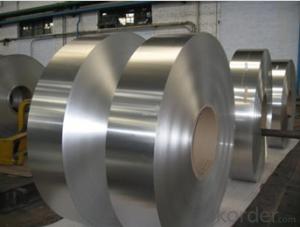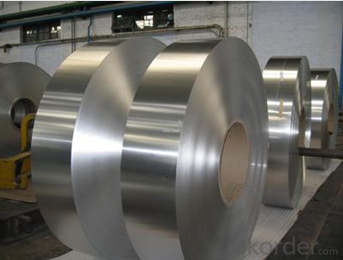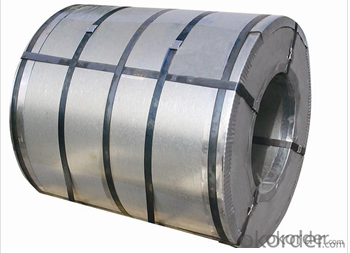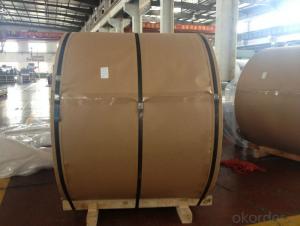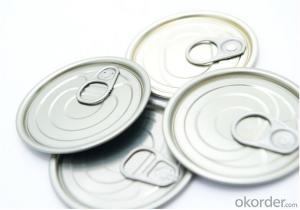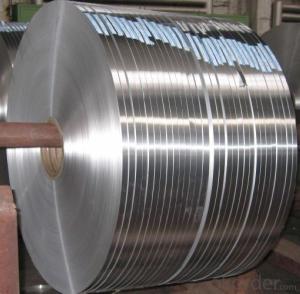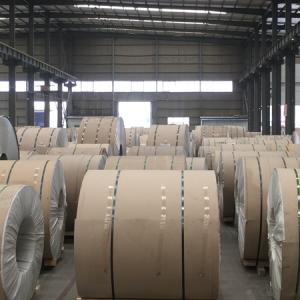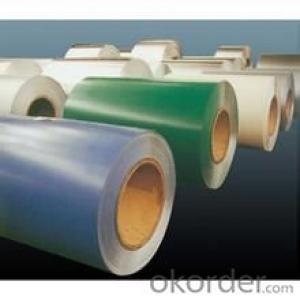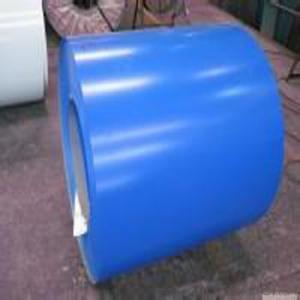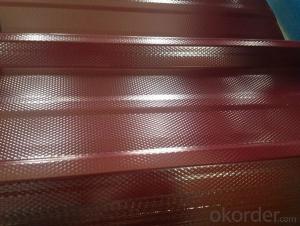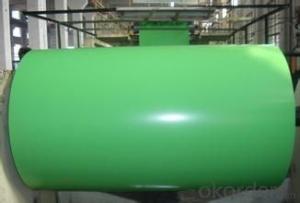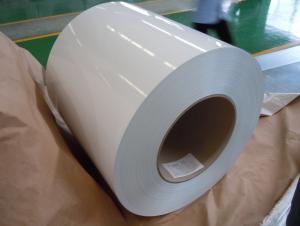Aluminum Painted Coil - Wholesale Aluminum Coil Products
- Loading Port:
- Qingdao
- Payment Terms:
- TT OR LC
- Min Order Qty:
- 5 m.t.
- Supply Capability:
- 500 m.t./month
OKorder Service Pledge
OKorder Financial Service
You Might Also Like
Specifications
aluminium coil
good quality
competitive price
short delivery time
long mutual beneficial business cooperation
Detailed informations
1.Alloy:AA1050,AA1060, AA1070, AA1100, AA3003, AA3004, AA3005, AA3105, AA5005, AA5052, AA5754, AA5083, AA8011
2.Temper : H12, H14, H16, H18, H22, H24, H26, H32,HO, F
3. Thickness : 0.02mm – 10mm
4. Width : 10mm- 2000mm
5. Standard : ISO9001:2000, SGS , GB/T17748-1999, ASTM, EU standard .
6. Inner diameter : 150mm , 405mm ,500mm 505mm , 508mm
7. Coil weight : 1.5tons – 5.0 tons
8. Surface Quality : be free from Oil Stain, Dent, Inclusion, Scratches, Stain, Oxide Dicoloration, Breaks,
Corrosion, Roll Marks, Dirt Streaks and other defect which will interfere with use
9. Shipment: By bulk vessel or By container
Pictures
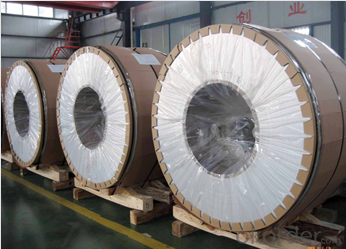
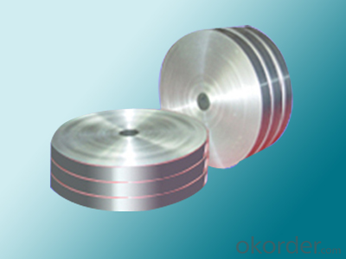
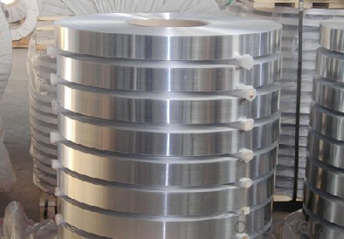
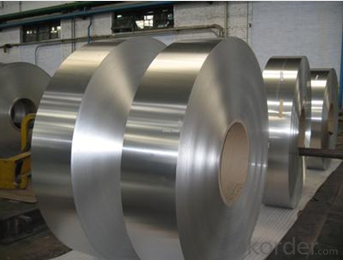
Product Description
Aluminium is remarkable for the metal's low density and for its ability to resist corrosion due to the phenomenon of passivation. Structural components made from aluminium and its alloys are vital to the aerospace industry and are important in other areas of transportation and structural materials. The most useful compounds of aluminium, at least on a weight basis, are the oxides and sulfates.
Despite its prevalence in the environment, no known form of life uses aluminium salts metabolically. In keeping with its pervasiveness, aluminium is well tolerated by plants and animals. Owing to their prevalence, potential beneficial (or otherwise) biological roles of aluminium compounds are of continuing interest.
The earliest citation given in the Oxford English Dictionary for any word used as a name for this element is alumium, which British chemist and inventor Humphry Davy employed in 1808 for the metal he was trying to isolate electrolytically from the mineral alumina. The citation is from the journal Philosophical Transactions of the Royal Society of London: "Had I been so fortunate as to have obtained more certain evidences on this subject, and to have procured the metallic substances I was in search of, I should have proposed for them the names of silicium, alumium, zirconium, and glucium."
FAQ
1. What is the applications?
Outdoor decoration, business chain, exhibition of advertisement decoration and display ,ACP, wall cladding, facades, roofs and canopies, ceilings, signboards, blind window, display platforms, electrical panels etc.
2. What is the popular size?
1000*2000,1200*2400,1219*2438,1220*2440
1000*3000,1250*3000,1500*3000 etc.
3. What is the coating?
Polyester, Fluorocarbon, polyurethane and epoxy coating
4. What is the Surface Quality?
be free from Oil Stain, Dent, Inclusion, Scratches, Stain, Oxide Dicoloration, Breaks,
Corrosion, Roll Marks, Dirt Streaks and other defect which will interfere with use
5. How about the shipment?
Shipment: By bulk vessel or By container
Welcome to inquiry us! Hope we can establish a long-term relations of cooperation.
- Q: Are aluminum coils resistant to abrasion?
- Yes, aluminum coils are generally resistant to abrasion. Aluminum is known for its durability and ability to withstand wear and tear. It has a high strength-to-weight ratio and excellent corrosion resistance properties, making it suitable for various applications where abrasion resistance is required. Additionally, aluminum coils are often coated or treated with protective finishes, further enhancing their resistance to abrasion. However, the specific level of resistance may vary depending on the specific alloy and the surface treatment applied to the coils.
- Q: Can aluminum coils be used in low-friction applications?
- Yes, aluminum coils can be used in low-friction applications. Aluminum is a lightweight and corrosion-resistant material that has excellent thermal conductivity. These properties make it suitable for various applications where low-friction is desired. In industries such as automotive, aerospace, and HVAC systems, aluminum coils are often used in heat exchangers, evaporators, condensers, and cooling coils. These coils are designed to efficiently transfer heat, while minimizing friction and energy loss. Additionally, aluminum coils can be used in electrical motors, generators, and transformers, where low friction is essential for smooth operation and reduced energy consumption. The lightweight nature of aluminum also helps to reduce the overall weight of the system, leading to improved efficiency. Furthermore, aluminum coils can be utilized in various types of machinery and equipment that require low friction, such as conveyor systems, sliding mechanisms, and bearings. Aluminum's low coefficient of friction allows for smooth and efficient movement, minimizing wear and tear on the components. Overall, aluminum coils are a versatile solution for low-friction applications due to their lightweight, corrosion-resistant, and thermally conductive properties. Their use can lead to improved energy efficiency, reduced maintenance costs, and enhanced performance in a wide range of industries.
- Q: Can aluminum coils be used for food processing conveyor systems?
- Aluminum coils are a viable option for food processing conveyor systems. The food processing industry favors aluminum for its advantageous properties. To begin with, aluminum's lightweight nature facilitates effortless installation and transport. This aspect proves especially valuable for conveyor systems that necessitate frequent reconfiguration or relocation. Moreover, aluminum exhibits exceptional resistance to corrosion, a pivotal attribute in food processing environments where exposure to moisture, chemicals, and food particles is prevalent. Additionally, aluminum's hygienic attributes make it easy to clean and maintain, ensuring adherence to food safety standards. Lastly, aluminum coils can be effortlessly molded and customized to meet the specific requirements of conveyor systems, thereby facilitating efficient and effective food processing operations. Consequently, aluminum coils emerge as a fitting choice for food processing conveyor systems.
- Q: Are there any limitations on the width-to-thickness ratio of aluminum coils?
- Aluminum coils have limitations on their width-to-thickness ratio. This ratio greatly influences the strength and performance of the coils. If the ratio is too high, problems like buckling, warping, or even coil failure can occur. The specific limitations on this ratio depend on factors such as the alloy composition, temper, and intended use of the coil. Different alloys and tempers have varying mechanical properties and can handle different ratios. Moreover, specific applications like roofing, automotive, or packaging may have their own requirements for the width-to-thickness ratio. Manufacturers usually provide guidelines and specifications for acceptable ratios based on their products. These guidelines ensure that coils are used within their intended capabilities and prevent issues caused by excessive ratios. Users and designers must consider these limitations and guidelines when selecting and using aluminum coils. Failing to adhere to these limitations can result in compromised performance, increased risk of damage, and potential safety concerns. Therefore, consulting the manufacturer's recommendations and industry standards is crucial for determining the appropriate width-to-thickness ratio for a given application.
- Q: We had a BBQ a few days ago and left our pack of aluminum foil on the table out side. It rained that night and the following night. I went out to take the trash out and heard a odd noise. It was the pack of foil boiling hot. The water from the rain was steaming out of it. When I picked it up you could feel the warmth coming from the center of it.It was 2 days after the BBQ, was never near the heat of that. It was on a separate table.The table is shaded all day, so it didn't heat from the sun. Plus aluminum does not transfer heat.It just don't make since to me. I unrolled some of it and it is dark grey from being heated so hot. I never heard of it and tried to find info, but to no avail. So out of curiosity I am asking.
- Aluminium is one of the best conductors of heat so the effect may have been a rare entropic incident where the water rapidly evaporated due to the warmth of the air. What's more likely is that the aluminium was exposed to the water and the rain was slightly penetrative. Aluminium usually has aluminium oxide protection to protect against corrosion and reaction but something may have depleted that layer causing a reaction and the gas you saw steaming wasn't water but hydrogen gas.
- Q: Are aluminum coils suitable for heat sinks?
- Indeed, aluminum coils are well-suited for heat sinks. The reason for aluminum's popularity in this regard lies in its exceptional thermal conductivity and affordability. Its remarkable thermal conductivity permits efficient heat transfer from a heat source to the heat sink's fins, which effectively dissipate the heat into the surrounding environment. Moreover, aluminum possesses the advantageous qualities of being lightweight and easily moldable into different shapes, thereby rendering it a versatile material for heat sink purposes. All in all, aluminum coils prove to be a fitting option for heat sinks due to their ability to effectively dissipate heat and their cost-effectiveness.
- Q: Are aluminum coils suitable for insulation applications?
- No, aluminum coils are not suitable for insulation applications.
- Q: What are the potential health risks associated with aluminum coils?
- Aluminum coils are commonly used in HVAC systems for their durability and heat transfer properties. While they are generally considered safe, there are potential health risks associated with aluminum coils if certain conditions are not met. One of the primary concerns is the potential for aluminum to leach into the air or water supply. Aluminum is a known neurotoxin, and excessive exposure to it can lead to various health issues, particularly in individuals with pre-existing conditions such as kidney disease or weakened immune systems. However, the amount of aluminum that may leach from coils is typically minimal and unlikely to pose a significant risk to most people. Another potential health risk is related to the accumulation of dust, dirt, and other particles on the aluminum coils. These particles can act as a breeding ground for bacteria, mold, and other allergens, which may negatively affect indoor air quality. If not properly maintained and cleaned, these contaminants can cause respiratory problems, allergies, and even infections in susceptible individuals. Furthermore, aluminum coils can be a source of electromagnetic fields (EMFs) due to the electric currents passing through them. While the health effects of EMF exposure are still a topic of ongoing research, some studies suggest a potential link between high levels of EMFs and certain health conditions, including cancer. However, it is important to note that the levels of EMFs emitted by aluminum coils are generally considered to be within safe limits and unlikely to pose significant health risks. To mitigate these potential health risks, it is crucial to ensure proper maintenance and cleaning of aluminum coils. Regular inspections, professional cleaning, and changing air filters can help prevent the accumulation of contaminants and maintain good indoor air quality. It is also recommended to consult with HVAC professionals to ensure proper installation and maintenance of the coils, minimizing the risk of aluminum leaching or excessive EMF exposure. In conclusion, while there are potential health risks associated with aluminum coils, they are generally considered safe when properly maintained. Taking necessary precautions and following recommended maintenance practices can help minimize any potential health concerns associated with aluminum coils in HVAC systems.
- Q: What are the common cleaning and maintenance products for aluminum coils?
- Some common cleaning and maintenance products for aluminum coils include mild detergents, non-abrasive cleaners, and aluminum coil cleaners. Additionally, soft brushes or cloths can be used to remove dirt and debris from the coils. It is important to avoid harsh or abrasive cleaners that can damage the aluminum surface.
- Q: Can aluminum coils be used in the production of solar reflectors?
- Yes, aluminum coils can be used in the production of solar reflectors. Aluminum is a commonly used material in the manufacturing of solar reflectors due to its high reflectivity and durability. The coils can be processed and shaped into the desired form for the reflector, allowing for efficient reflection of sunlight onto the solar panels. Additionally, aluminum is lightweight, making it easier to handle and install in solar reflector systems.
Send your message to us
Aluminum Painted Coil - Wholesale Aluminum Coil Products
- Loading Port:
- Qingdao
- Payment Terms:
- TT OR LC
- Min Order Qty:
- 5 m.t.
- Supply Capability:
- 500 m.t./month
OKorder Service Pledge
OKorder Financial Service
Similar products
Hot products
Hot Searches
Related keywords
